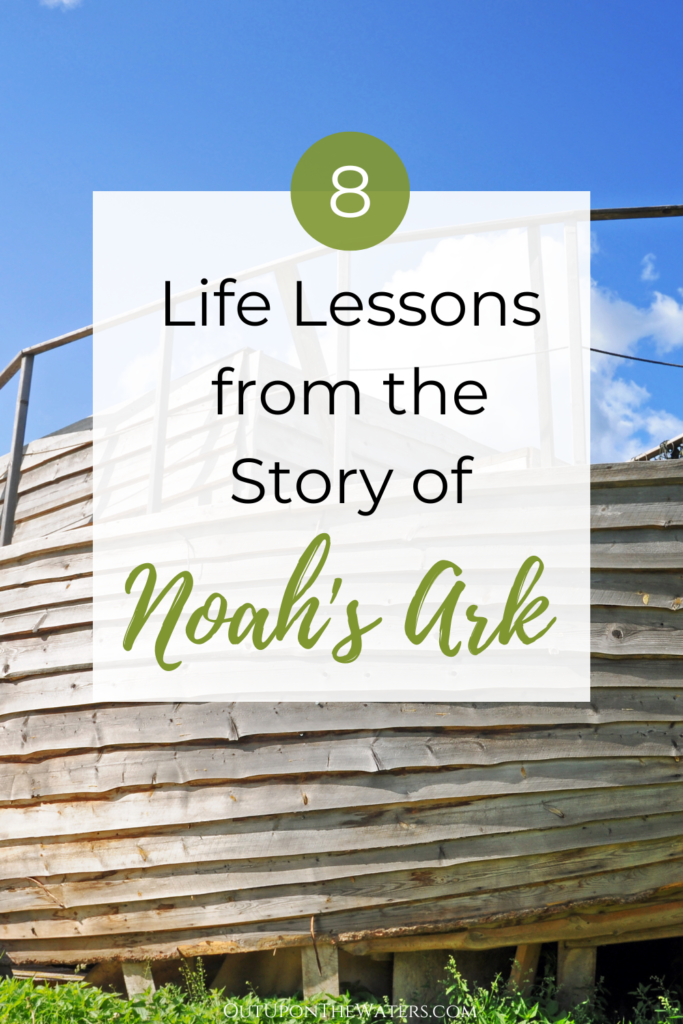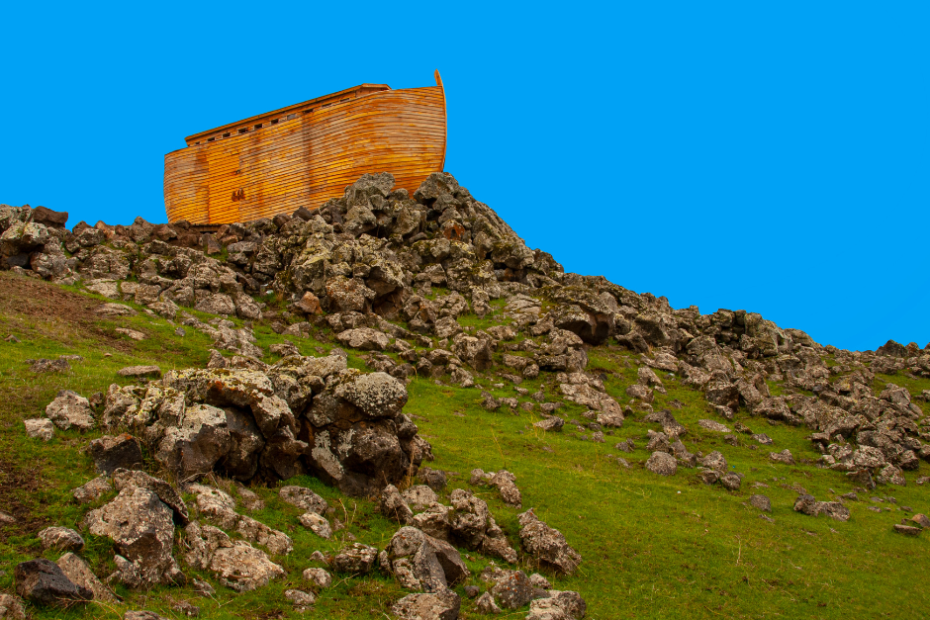The story of Noah’s Ark is a classic Bible story that tells of the consequences of rebellion and of God’s protection and provision. While on the surface, the story seems to be about a God who answers violence with violence, when we dig beneath the surface of the story, we find some valuable life lessons about our relationship with God and about the place of hope.
I love the story of Noah’s Ark, and I love especially talking about this story to kids and youth, largely because they like to ask hard questions. One day when we were doing a Noah’s Ark themed children’s program at church, one of the teenagers came up to me and asked, “Why is God’s solution to the violence of humans beings to destroy them? He sees that human beings are hurting and killing each other, so his reaction is to kill them?” I told her that I love this question. I love this question because it challenges the simple understanding of the story of Noah’s Ark and it requires us to look deeper at the significance of the story and at God’s relationship to human beings. On the surface, it might seem that God is angry with humanity for it’s violence and that he answers that violence with more violence. However, when we start to dig beneath the surface of the Noah’s Ark story, we see that there is more to the story than simply an angry God reacting to sinful humanity. What if the death and destruction of sinful humanity in the Noah’s Ark story is not anger and retribution, but rather the natural consequence of straying far from God?

8 Life Lessons We Can Learn from Noah’s Ark
Noah’s Ark is an interesting and challenging story that we find in Scripture. It is a story of rebellion and of God’s reaction to it. When we dig beneath the surface of the story of Noah’s Ark, we find that there are some valuable lessons that we can learn about our relationship with God and the hope that we have in our lives.
- God cares for and protects us.
- Rebellion leads to death.
- Staying close to God keeps you safe.
- Trust God with the impossible.
- God might ask you to do something that sounds crazy.
- Recognizing God’s voice makes all the difference.
- Our hope is in Christ alone.
- Look for signs of hope.
God cares for us and protects us.
Noah’s ark is a story of God’s protection and provision. In the midst of wickedness and rebellion, God chooses and protects Noah and his family from the consequences of the wickedness that fills the earth. The story of Noah’s ark tells us that God will care for us and protect us. What is crucial, both for Noah and for ourselves, is that God’s protection comes when we stay close to him and when we follow his instructions. For we also learn in the story of Noah’s Ark, that God allows us to experience the natural consequences of rebellion if that is the path that we should choose.
Rebellion leads to death.
The story of Noah and the ark tells us that human beings are so wicked that God regrets creating them and wipes all but Noah and his family from the face of the earth (Genesis 6:5-8). The consequence of human beings’ rebellion is death.
This is the same theme that we find in the story of Adam and Eve: the consequence of rebellion is death.
This is a curious dynamic in the Bible. Over and over, we see that rebellion leads to death and destruction. If God is Creator and the source of all life, then this dynamic makes perfect sense. We do not even need to attribute anger and retribution to God. Perhaps this story is not telling us that an angry God decided to destroy much of his creation, but rather that God allows us to experience the consequences of our rebellion. The natural consequence of our turning away from God (the source of all life and the Creator of the universe) is death and destruction.
There are two elements to this turning away from God: 1. When we turn away from the source of life, what could we turn toward except death? 2. God, who created the whole universe, knows how it works best. When we choose to disobey the rules, then we can expect things to go poorly.
Staying close to God keeps you safe.
Genesis 6 tells us that Noah was a righteous man and that he found favor in the eyes of the LORD. Noah listened to God when God warned him of the coming flood. And “Noah did everything just as God commanded him” (Genesis 6:22). We could interpret the story of Noah as one that tells us that God rewards good behavior (God saved Noah because he was righteous). But we can also interpret it as telling us that staying close to God keeps us safe. If God knows how the world works best, and he wants to protect and guide us, then we ought to stay close to him and obey his instructions.
Trust God with the impossible.
Noah is given the enormous task of building a huge boat to withstand a flood that fills the earth. Not only that, but Noah is to fill the ark with enough living creatures to keep all the species alive. Genesis 6:19 says, “You are to bring into the ark two of all living creatures, male and female, to keep them alive with you.” Genesis 7:2 says, “Take with you seven pairs of every kind of clean animal, a male and its mate, and one pair of every kind of unclean animal, a male and its mate…” Regardless of exactly how many pairs of animals God tells Noah to take with him, what we know is this: Noah was tasked with taking enough creatures with him to keep all the species on earth alive.
The task that God gives to Noah is so huge that it takes around 100 years to complete. God gives Noah detailed instructions on how to build the ark: what materials to build it out of and exactly what size it needs to be (Genesis 6:14-16). The task that God gives to Noah seems impossible. But God doesn’t leave Noah on his own to accomplish it. He gives him instructions; he brings the animals (Genesis 7:15); he helps Noah accomplish his task.
One lesson that we can learn from the story of Noah’s ark is this: When things seem impossible, trust God. Just as Noah completed God’s instructions, one step at a time, small steps of obedience in our lives can lead to great results.
God might ask you to do some things that sound crazy.
God might ask some surprising and unexpected things of you. God told Noah to build a giant boat in the middle of dry land, when there was no rain in sight. To his neighbors, this must have seemed like foolishness or madness. Even once the ark was completed and Noah was told to board the ship with his family, it was still seven days until the rains came (Genesis 7:4). God’s instructions to Noah were in no way reasonable if we are measuring by the standards of the world. Noah had to trust God and to take a risk, one that might have seemed crazy to his neighbors and those around him.
Being able to recognize God’s voice makes all the difference.
This is a crucial part of the story of Noah and the ark: being able to recognize God’s voice makes all the difference. God instructed Noah to do something that seemed crazy and impossible. It was a huge task. And there was no evidence around him for a need for a giant ark, except for the fact that God had warned Noah and told him to build the ark.
When I was discussing this story with my kids one day, we asked the question, ‘If you were living in Noah’s day, do you think you would have believed him that God told him to build an ark?’ One of my kids, very insightfully, said that he would if he knew God and recognized his voice.
We can also ask this question differently: If you were in Noah’s position, and God asked you to do something that sounded impossible or crazy, what would you do? This is where being able to recognize God’s voice makes all the difference. Noah listened to God because he knew his voice. He knew that it was God himself who was giving him these warnings and instructions. If we cannot discern God’s voice from other voices, then we do not know which voice to trust.
Noah was righteous and walked faithfully with God. This faithful walking would lead to a familiarity that would allow Noah to know God’s voice and to trust his instructions.
So too with us: we need to walk faithfully with God and to become familiar with his voice, so that we can heed his instruction.
Our hope is in Christ alone.
The flood doesn’t actually wipe sin and wickedness from the face of the earth. After the flood, there is still rebellion, there is still violence, there are still power struggles, there are still people wandering far from God. The flood doesn’t fix the problem of sinful human nature. We still place our wills above God’s will and we still turn away from him. It is only in Jesus Christ that God takes human nature and submits it to death, in order to redeem it. Jesus takes our “penal” death (the consequence of turning away from God) and turns it into a “mystical” death in which we can participate: we can lay down our own wills and allow God to work in us, changing us from obstinate and sinful creatures to creatures in harmony with him.
Look for signs of hope.
At the end of the great flood, when the ark finally finds dry land and Noah, his family, and all the animals are able to exit, God hangs a rainbow in the sky as a sign of the covenant that he makes, never to flood the earth again (Genesis 9:13). The rainbow is a sign of hope, a sign of God’s promise that “never again will the waters become a flood to destroy all life” (Genesis 9:15). The rainbow is reminder of God’s love for us. God is faithful to remind us of his presence, and he is faithful to place signs of hope in our daily lives. When you are facing loss, challenges, failures, or any kinds of struggle, look for signs of hope and trust that God loves and cares for us and fulfills his promises.

This is a beautiful article. I love your thoughts here and premise. Thank you.
Thanks for the feedback, Deborah. I’m glad you found this helpful.
you made my Saturday its deep and intriguing, thanks Becky God bless you
So interesting and in logical terms can apply anytime of Noah’s Ark, even times now in cautionary terms. Best wishes.